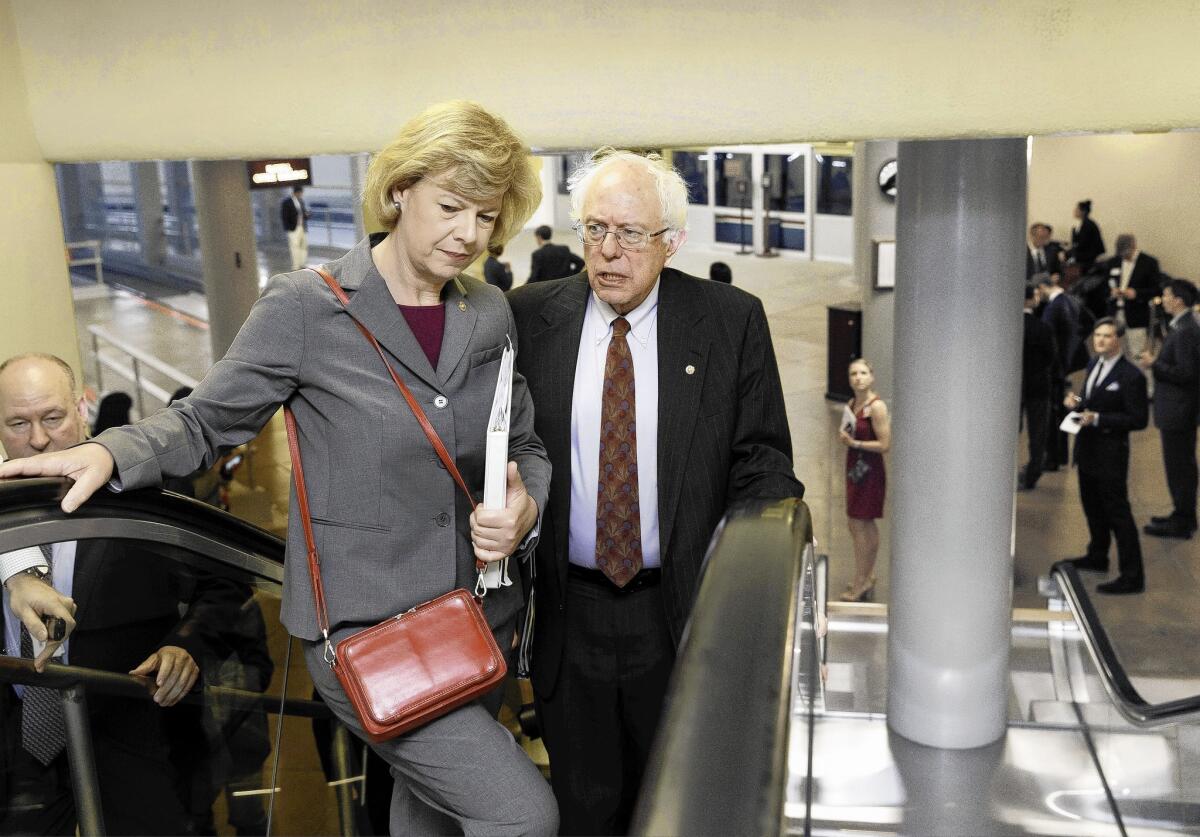Veterans’ wait times at El Paso VA are latest to come under scrutiny

Reporting from SAN ANTONIO — Veterans have been forced to wait more than two months on average for mental health treatment at the El Paso VA facility, and more than a third never received it, according to a survey released Wednesday as lawmakers in Washington worked to bridge partisan differences on legislation to fix the larger mess within the Department of Veterans Affairs.
The survey contradicts VA data, according to Rep. Beto O’Rourke (D-Texas), who commissioned it, and adds to the number of VA sites nationwide that have come under scrutiny over misrepresented wait times for healthcare.
Veterans waited an average of 71 days for mental health treatment in El Paso, and more than 36% never saw a provider, according to the survey of nearly 700 veterans. O’Rourke said VA officials told him that each month during the last year, 85% to 100% of veterans seeking first-time mental health appointments saw a provider within two weeks.
Of veterans requesting non-mental-health appointments, about 72% were not seen within two weeks, according to O’Rourke. Their average wait to see a provider was 85 days. O’Rourke said his office undertook the survey after hearing from veterans and relatives who suffered because of delayed care, including a young veteran who, after struggling to get mental health care, killed himself.
John A. Mendoza, director of the El Paso VA Health Care System, said in a statement that the system shared O’Rourke’s concerns “for ensuring timely access to the primary and mental healthcare that our veterans have earned and deserve” and “will not waver in our efforts to improve.”
O’Rourke is to meet with Mendoza this week. O’Rourke, a member of the House Veterans Affairs Committee, plans to propose legislation that would replicate the survey at 151 VA facilities across the country, with funding coming from canceled VA bonuses.
In the meantime, Washington lawmakers tried to reach a compromise on legislation to reduce veterans’ wait times for healthcare and hold VA officials more accountable.
Sen. Bernie Sanders (I-Vt.), chairman of the Senate Veterans Affairs Committee, met with Sen. John McCain (R-Ariz.) and Rep. Jeff Miller (R-Fla.), chairman of the House Veterans Affairs Committee, to discuss their competing proposals.
Though lawmakers from both parties support allowing veterans who face long waits at VA facilities to see private doctors, a number of Republicans oppose Sanders’ bill to allow the VA to hire more doctors and nurses and to open more facilities.
The VA currently spends about one-tenth of its healthcare budget for private care, but some lawmakers have expressed concern that the Veterans Choice Act, introduced by Republicans this week, could steer many more veterans to private doctors.
“Establishing a scenario whereby veterans can choose to leave the VA healthcare system places the entire system at risk,” Paralyzed Veterans of America said in a statement. Meanwhile, the American Legion supports the Veterans Choice Act. Such differences underscore how hard it can be to get an agreement on VA reform legislation.
Lawmakers from both parties have been scrambling to draft legislation to improve veterans’ care after a scathing report last week by the VA inspector general. The interim report found a systemic problem nationwide in scheduling veterans for healthcare in a timely manner, including instances in which VA staff falsified records to cover up long waits. Investigators found an average wait of 115 days for a sample of veterans at the VA facility in Phoenix.
The inspector general is looking at 42 sites but has declined to identify any facilities other than Phoenix, San Antonio and Fort Collins, Colo. But VA officials reported unauthorized wait lists at facilities in the Midwest to Kansas senators.
The effort to strike a bipartisan deal came as House Republican leaders wrote President Obama calling the VA scandal a “national disgrace” and urging him to lay out “your vision for reforming what is clearly a broken system.”
House Speaker John A. Boehner (R-Ohio) and other GOP leaders also complained about the VA’s failure to cooperate with an oversight committee’s request for information. And they urged the president to support Republican-sponsored legislation that would give any veteran facing a 30-day wait at a VA facility the option to seek private care at VA expense and persuade the Senate to pass the House-approved VA Management Accountability Act, which would expand the VA secretary’s authority to fire or demote senior staff for poor performance.
The accountability measure has drawn criticism from employee groups that warn it could politicize the VA. “Nothing in the bill prevents a secretary from cleaning house under the guise of performance,” the Senior Executives Assn. said in a letter to lawmakers. Sanders, who caucuses with Democrats, has written his own version of the measure to include protections for employees to prevent “wholesale political firings.”
Also on Wednesday, acting VA Secretary Sloan Gibson held his first meeting with veterans groups in Washington, announcing that the VA had contacted 1,586 veterans seeking healthcare at the Phoenix facility to begin scheduling their appointments. He plans to travel to Phoenix on Thursday.
“The inspector general confirmed we have real issues when it comes to patient scheduling and access, and we have moved immediately to address those issues in Phoenix,” Gibson said in a statement.
Hennessy-Fiske reported from San Antonio and Simon from Washington.
More to Read
Sign up for Essential California
The most important California stories and recommendations in your inbox every morning.
You may occasionally receive promotional content from the Los Angeles Times.












